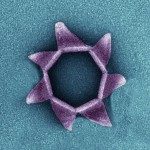Link to Pubmed [PMID] – 19220881
Biol. Direct 2009;4:7
BACKGROUND: The pioneering ancestor of land plants that conquered terrestrial habitats around 500 million years ago had to face dramatic stresses including UV radiation, desiccation, and microbial attack. This drove a number of adaptations, among which the emergence of the phenylpropanoid pathway was crucial, leading to essential compounds such as flavonoids and lignin. However, the origin of this specific land plant secondary metabolism has not been clarified.
RESULTS: We have performed an extensive analysis of the taxonomic distribution and phylogeny of Phenylalanine Ammonia Lyase (PAL), which catalyses the first and essential step of the general phenylpropanoid pathway, leading from phenylalanine to p-Coumaric acid and p-Coumaroyl-CoA, the entry points of the flavonoids and lignin routes. We obtained robust evidence that the ancestor of land plants acquired a PAL via horizontal gene transfer (HGT) during symbioses with soil bacteria and fungi that are known to have established very early during the first steps of land colonization. This horizontally acquired PAL represented then the basis for further development of the phenylpropanoid pathway and plant radiation on terrestrial environments.
CONCLUSION: Our results highlight a possible crucial role of HGT from soil bacteria in the path leading to land colonization by plants and their subsequent evolution. The few functional characterizations of sediment/soil bacterial PAL (production of secondary metabolites with powerful antimicrobial activity or production of pigments) suggest that the initial advantage of this horizontally acquired PAL in the ancestor of land plants might have been either defense against an already developed microbial community and/or protection against UV.

